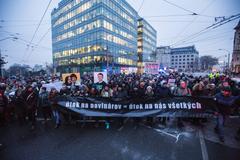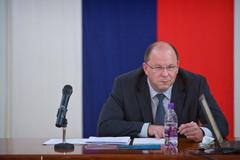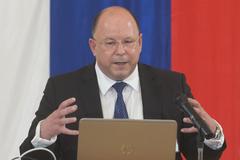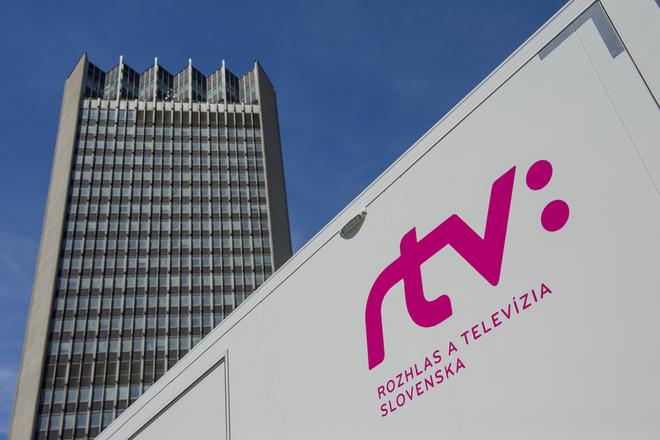More than 200 reporters from Slovak media outlets have signed an open letter entitled “Not Even Public-service Media Can be Silenced”. They expressed their concern with the current developments at the public-service broadcaster RTVS, where several journalists and editors have recently either been dismissed or decided to leave on their own.
“Those trying to silence the media are first of all meddling with the right of the public to know what is happening in the country,” reads the letter.
It was signed by reporters from, for example, the Sme, Denník N, Korzár and Hospodárske Noviny dailies, as well as the Trend and Týždeň weeklies, the Aktuality.sk and Euractiv.sk websites, the SITA newswire, and the private broadcaster JOJ.

Meanwhile, President Andrej Kiska has expressed his concern over the current situation at the broadcaster. He expects the respective institutions, like the parliamentary committee, the Culture Ministry and the television council, to adopt measures to protect the work of the broadcaster’s reporters and content quality.
“A free and independent media are an important and inevitable condition for democracy,” he wrote on Facebook on May 3.
Despite the recent dismissals of several critical reporters, and the termination notices submitted by others, the broadcaster’s management claims the situation is standard and the departures of journalists often accompany the change in the management, Sme reported.
Public-service media important
“The new RTVS management is bullying, restricting and getting rid of long-time reporters who have significantly contributed to restoring the trust of the public in public-service media in the past few years,” reads the letter.
Both the public radio and television are “normalised” by people who combine their journalistic experience with the work in political marketing and PR.
“Their current steps don’t indicate that they are able to maintain the previous credibility of news and publicising programmes,” the letter continues.
While the coverage is impacted by the censorship and there are even attempts to broadcast conspiracy theories and propaganda, the reporters who have publicly protected the coverage against such practices have become the victims of persecution from the management.

The reporters who signed the letter have called on the people responsible for the broadcaster and its programme, namely general director Jaroslav Rezník, and the people responsible for news coverage: Vahram Chuguryan, Hana Lyons and Petra Stano Maťašovská.
“RTVS is a public-service institution financed from licence fees,” the letter reads. “It doesn’t belong to any government or political party, but the public. RTVS is an institution you should be able to run in a trustworthy way, without daily scandals.”
The broadcaster should serve the public, and not the political power that has been trying to silence journalists only two months after the murders of Ján Kuciak and his fiancée, Martina Kušnírová.
“Calling the journalists enemies turns us into potential targets of further violence and legitimises other potential attacks on journalists,” the reporters claimed. “Free media are the basic tool for public control. Silencing journalists and their replacement with obedient propagandists is the first step to introducing a dictatorship and totalitarian regimes.”
Rezník will explain the situation
At the end of last week, RTVS did not extend contracts with four external reporters, Jana Masárová, Matúš Dávid, Matúš Baňovič and Kristián Čekovský; all of whom have signed a letter in which they expressed concern with the current broadcaster’s management. Another reporter, Jana Maťková, has handed in her notice.

Reporter Zuzana Kovačič Hanzelová was punished for calling the situation “a normalisation” by being banned from working on political topics. She was later informed that the ban “was meant to be a joke”, as she informed on May 2.
Meanwhile, another crucial member of the news desk has asked for the termination of his contract: head of broadcast and former chief editor Jozef Matej. He has already informed his colleagues, and later published the information about the decision on Facebook, Sme reported.
Among the reasons he has listed is the end of several reporters, as well as the steps and behaviour of people responsible for the broadcaster and news coverage.
RTVS’ management does not think that the public, journalists or academia should be concerned about the current situation. It claims that it has legitimately elected a general director and appointed management that is working in favour of all the people paying the licence fees, as reported by the TASR newswire.

“The departures and arrivals of employees, which were more massive in the past, are a natural consequence of every new management and pose no reason for concern,” said the broadcaster’s spokesperson Erika Rusnáková, as quoted by TASR.
RTVS is maintaining its independence, public-service character and will continue as a source of quality, verified and trustworthy information, she added.
Nevertheless, Rezník was invited to explain the current situation at the May 3 session of the parliamentary media and culture committee.



 TV broadcaster RTVS (source: TASR)
TV broadcaster RTVS (source: TASR)